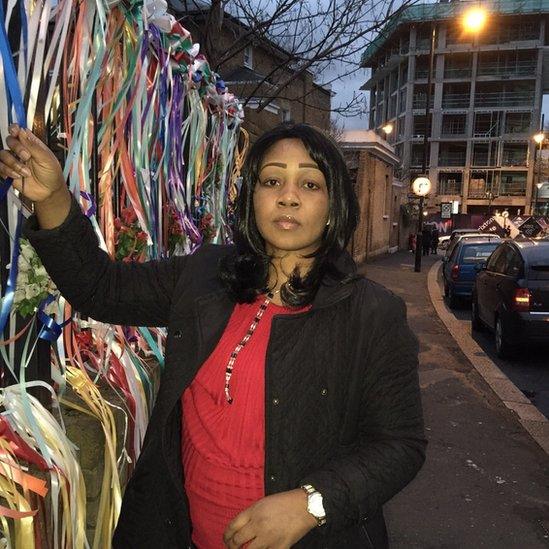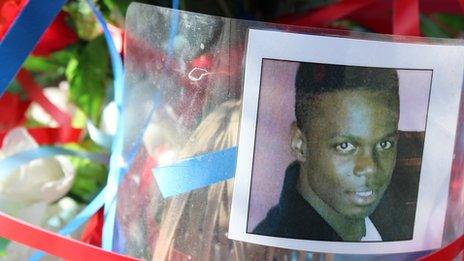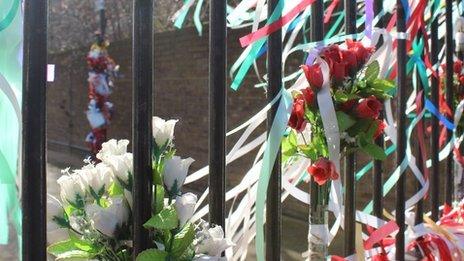Primary schools 'should join war on gangs'
- Published

Lorraine Jones at the spot where her son was killed
Children as young as nine are being used to hide weapons and carry drugs, an investigation by BBC Radio 4's Face the Facts has found.
Many youngsters are earning hundreds of pounds a week working for gangs, as they spread out beyond their bases in major cities like London.
The findings have prompted calls for primary schools to do more to combat the glamour of gangs.
Former gang member Joe, not his real name, describes the lure of gang life.
"I remember thinking, 'Wow - I'm a drug dealer now, I'm a big man'," says Joe who joined a gang aged 11.
"Being young doing that it just adds to your ego," he told the programme.
He has now left what turned out to be a highly lucrative if highly violent life.
"My older brother was in a gang. I used to see him come in with lots of money, all these flashy clothes, all the latest gadgets - and I wanted to be like him.
"What police officer is going to stop a kid in his school uniform?" Joe asks.
And it's because of that, and the money, that gang education needs to begin in primary schools, says Sheldon Thomas, chief executive of Gangsline.
The former gang member now helps young people escape that life.
"Once they start earning money it's too late. Money entraps people," he says.
"When you look out your window you would never know that your son or daughter is talking to a gang member.
"And what they do is they say, 'Ah, we'll buy you some sweets, we'll buy you a drink, or we'll buy you some trainers.'
"And before you know it, that guy says, 'Why don't you carry that over there, why don't you hold on to this for me?'"
Child drug dealers can earn hundreds of pounds a week.
'Stabbed'
"I was earning silly money," says Joe. "People just wanted to be around me."
But as the money Joe was earning increased, so did the danger he was in.
He stopped taking public transport, would only travel in a group and had to avoid certain areas completely.
"I've been stabbed in my neck with a screwdriver, stabbed in my back and stabbed in my leg. I've been shot at, and had a gun put to my head and a gun put in my mouth."
Although for most people, gang crime exists only in newspaper headlines, its victims tend to be closer in age and background to those in the gangs themselves.
Their exploits are often documented in gang-manufactured music videos.
These videos often show gang members and their friends drinking, surrounded by expensive cars, wads of cash and, sometimes, with attractive women.
One producer told Face The Facts, that they are used to advertise the money that can be made by working for specific gangs - in effect recruitment videos.
Video propaganda
Simply appearing on camera though can make you a target for others gangs.
The charity, Kids Company, says teenagers who attended their youth clubs have been beaten up and even stabbed as a result.
The videos are also used to issue threats to rival gangs.
"When we see something that concerns us we close early, we inform our local safer neighbourhood team that we've seen something which might escalate violence within the area - we even provide cabs or other safe transport for young people to get home," explained Natalie Akhad from Kids Company.
Former Home Office Minister Norman Baker told the BBC the videos are "a deeply distressing and unwelcome part of society".
The way to tackle them is better education which must start in primary schools, he believes.
A Department for Education spokesperson said it expected schools to make sure children are prepared for life in modern Britain.
'Dangers of gang life'
"We know many good schools already work with the police and other organisations to educate pupils and protect them from harm.
"We also updated guidance earlier this year setting out what schools should be doing to keep children safe and providing information on issues such as gang and youth violence."

Dwayne Simpson made a video about the dangers of life in gangs
Dwayne Simpson grew up in a part of London notorious for gangs.
Before he finished school, he had spent time in prison, but went on to set up a boxing club to keep youngsters in the area off the street.
And he made a video warning others about the dangers of gang life.
"If it wasn't for friends I wouldn't have a criminal record I wouldn't have been shot, I wouldn't have been stabbed" he warned.
"Before, there is no way I would walk on the road with my mum, little brother, sister, no-one. I didn't want to draw them into what I was in."
'We are scared'
The girls and money that many think come with life in a gang are temporary, he went on to say.
"I'm appealing to all of you, please just leave it alone."
Dwayne's video has never been played in public though, because last year he was stabbed to death while trying to help a friend who was being attacked by a suspected gang member.
"Every day, my sons have to pass on their way to school, the spot where he was killed," his mother, church minister Lorraine Jones, says.
"My daughters have to pass it on their way to work."
"This needs to stop. The community is scared - we are scared, and our fear is that it's going to erupt again," she says.
There are no national statistics on gang crime. In London, gang violence has fallen significantly since 2011, but last year it began to increase again.
According to the Metropolitan Police, the number of identified gang members in London has fallen from around 4,800 three years ago to 3,600 today.
For Joe, the decision to abandon gang life came following a call from his mother, after her house had been surrounded by some of his rivals armed with guns.
"The situation got dealt with in the wrong way, but nowadays I don't retaliate like that.

Dwayne's family frequently have to walk past the spot where he was killed
"I'm at peace. I don't wake up thinking, 'Oh no, the police are at my house again,' or some other stresses."
Joe says he regrets many of things he did.
"I'm not going to lie, you can make a lot of money so you think it's all bliss but when you come to reality and realise what you are into it's a whole big plate - and it's a plate that you won't be able to finish."
Face The Facts: Life in Gangland London is available on BBC iPlayer